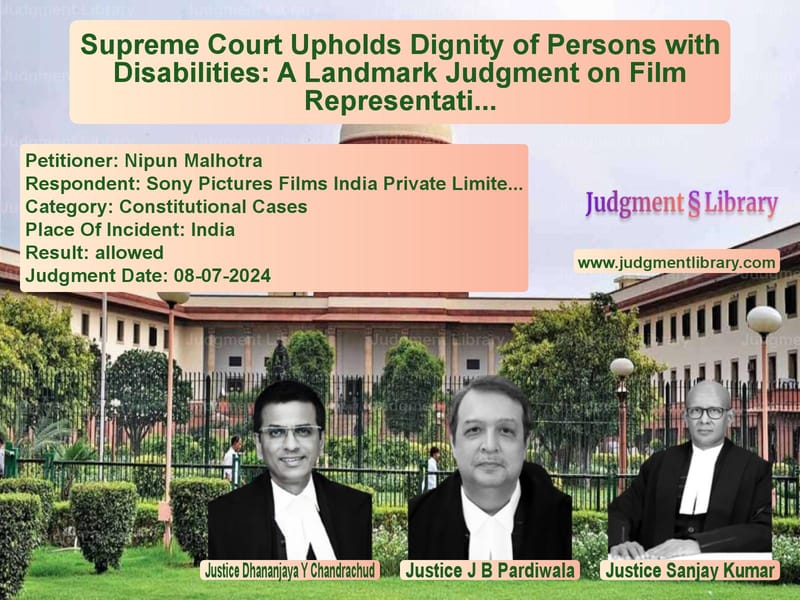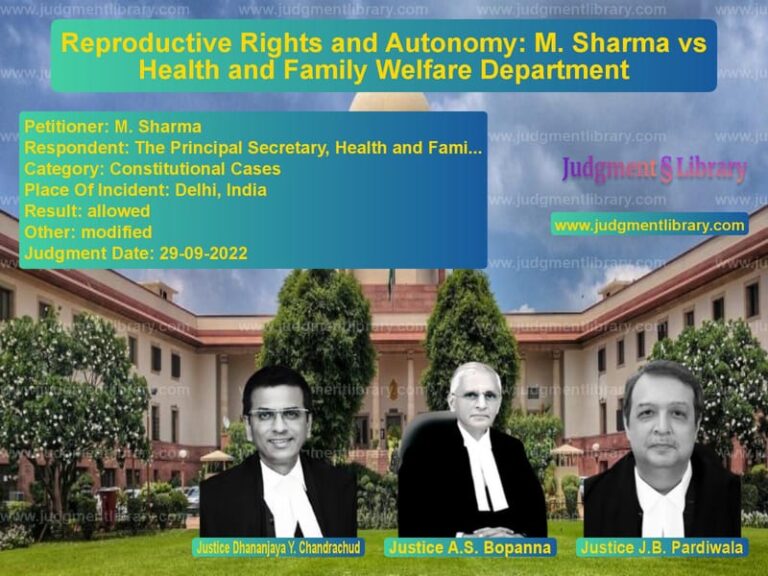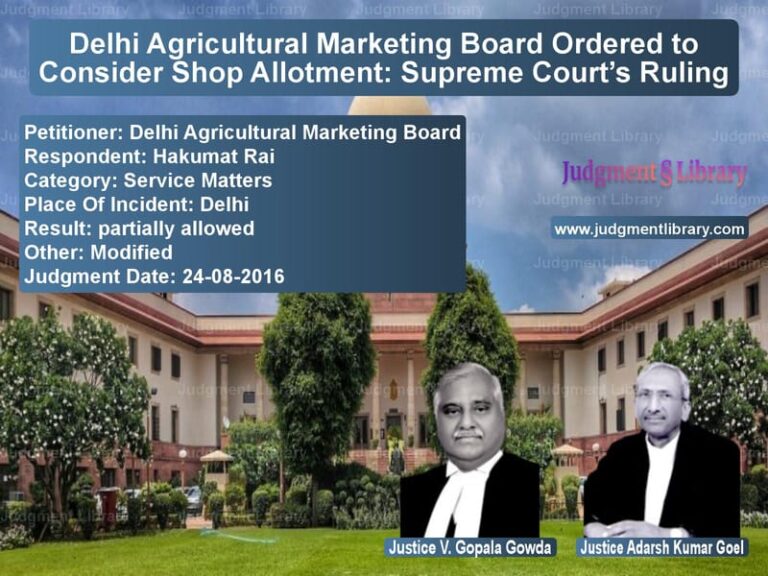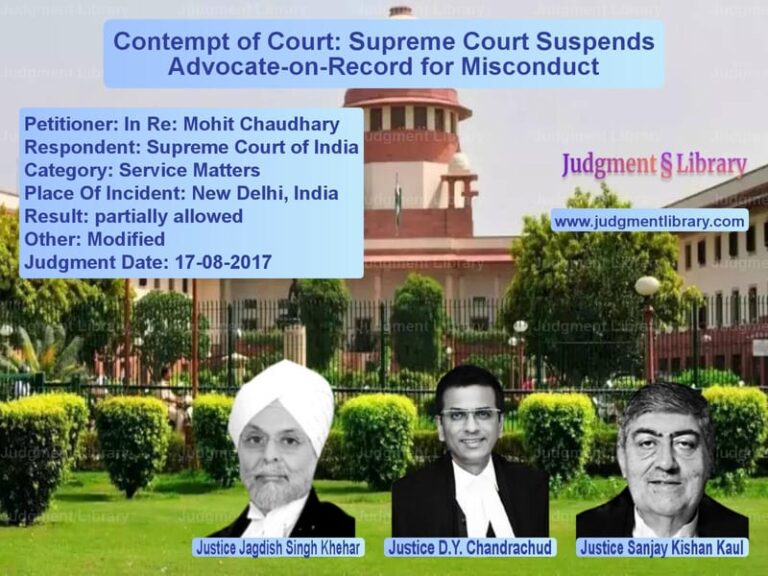Supreme Court Upholds Dignity of Persons with Disabilities: A Landmark Judgment on Film Representation
The Supreme Court of India has delivered a landmark judgment in Nipun Malhotra v. Sony Pictures Films India Private Limited, addressing the portrayal of persons with disabilities in cinema. The case revolved around the depiction of characters with disabilities in the film Aankh Micholi, which the appellant argued perpetuated stereotypes and derogatory language against persons with disabilities. The judgment not only reinforces the principles of dignity and non-discrimination enshrined in the Rights of Persons with Disabilities Act, 2016 (RPwD Act) but also examines the broader impact of media representations on the rights and perceptions of persons with disabilities.
Background of the Case
Nipun Malhotra, the appellant, is a disability rights activist and founder of an organization that promotes disability awareness and policy research. He challenged the depiction of characters with disabilities in the movie Aankh Micholi, claiming that it violated constitutional rights and statutory provisions.
He initially addressed a legal notice to Sony Pictures, objecting to scenes in the trailer that depicted persons with disabilities in a derogatory manner. These included references to a character with Alzheimer’s as a “bhulakkad baap” (forgetful father), a hearing-impaired person as a “soundproof system,” and a speech-impaired character as an “atki hui cassette” (stuck cassette). The appellant argued that the movie promoted harmful stereotypes and conveyed the message that persons with disabilities must conceal their impairments to be socially accepted.
Proceedings Before the High Court
The Delhi High Court dismissed Malhotra’s petition on the grounds of maintainability. The court noted that the film had already been certified for unrestricted public exhibition by the Central Board of Film Certification (CBFC) and found no legal justification for the relief sought by the appellant.
The High Court’s key findings were:
- The appellant had not challenged the CBFC certification process.
- The explanation provided by Sony Pictures that the film sought to portray resilience and strength among persons with disabilities was not contested by the appellant.
- The relief sought did not have legal backing, given the existing certification framework.
Supreme Court’s Analysis
The Supreme Court examined the legal framework governing film certification and the rights of persons with disabilities.
1. Film Certification and Freedom of Expression
The court reaffirmed that a filmmaker’s right to freedom of speech and expression under Article 19(1)(a) is subject to reasonable restrictions under Article 19(2). The Cinematograph Act, 1952, provides a framework for film certification, ensuring that films do not violate public decency, morality, or other constitutional values.
Read also: https://judgmentlibrary.com/supreme-court-dismisses-appeal-in-manipur-election-petition-case/
The court cited KA Abbas v. Union of India, stating that prior certification of films is a valid restriction on cinematic speech due to its potential for immediate and widespread impact. However, it also emphasized that restrictions on free speech must be narrowly construed.
2. Rights of Persons with Disabilities
The judgment emphasized the importance of the RPwD Act, which is based on the social model of disability. The Act recognizes that disability is not just a medical condition but a result of societal barriers that hinder equal participation.
The court highlighted that stereotypes about persons with disabilities have historically led to social exclusion and discrimination. It cited Vikash Kumar v. UPSC, where it had recognized the State’s positive obligation to create an enabling environment for persons with disabilities.
3. International Human Rights Framework
The court referred to the Convention on the Rights of Persons with Disabilities (CRPD), which India ratified in 2007. The CRPD mandates awareness-raising measures to combat stereotypes and promote the dignity of persons with disabilities. The judgment observed that media portrayals must align with these principles and ensure that representations do not reinforce negative stereotypes.
Key Findings of the Judgment
The Supreme Court laid down the following principles:
- Freedom of Expression vs. Dignity: While filmmakers have a right to creative freedom, this does not extend to misrepresenting or mocking marginalized communities. The overall message of the film must be considered to determine whether it infringes on the dignity of persons with disabilities.
- Need for Sensitivity in Media: The court emphasized that films should avoid using persons with disabilities as comic relief or portraying them as objects of pity.
- Role of the CBFC: The court upheld the CBFC’s role in ensuring that films comply with the RPwD Act and do not perpetuate harmful stereotypes.
- Encouragement of Inclusive Storytelling: The judgment called for filmmakers to involve persons with disabilities in the storytelling process to ensure accurate and respectful representation.
Implications of the Judgment
This ruling is a milestone in the fight for disability rights in India. It sets a precedent for holding filmmakers accountable for their portrayals of marginalized communities and reinforces the need for inclusive representation in media.
By balancing free speech with the rights of persons with disabilities, the Supreme Court has reaffirmed the constitutional commitment to dignity, equality, and non-discrimination.
Petitioner Name: Nipun Malhotra.Respondent Name: Sony Pictures Films India Private Limited & Others.Judgment By: Justice Dhananjaya Y Chandrachud, Justice J B Pardiwala, Justice Sanjay Kumar.Place Of Incident: India.Judgment Date: 08-07-2024.
Don’t miss out on the full details! Download the complete judgment in PDF format below and gain valuable insights instantly!
Download Judgment: nipun-malhotra-vs-sony-pictures-films-supreme-court-of-india-judgment-dated-08-07-2024.pdf
Directly Download Judgment: Directly download this Judgment
See all petitions in Fundamental Rights
See all petitions in Constitution Interpretation
See all petitions in Public Interest Litigation
See all petitions in Legislative Powers
See all petitions in Separation of Powers
See all petitions in Judgment by Dhananjaya Y Chandrachud
See all petitions in Judgment by J.B. Pardiwala
See all petitions in Judgment by Sanjay Kumar
See all petitions in allowed
See all petitions in supreme court of India judgments July 2024
See all petitions in 2024 judgments
See all posts in Constitutional Cases Category
See all allowed petitions in Constitutional Cases Category
See all Dismissed petitions in Constitutional Cases Category
See all partially allowed petitions in Constitutional Cases Category







